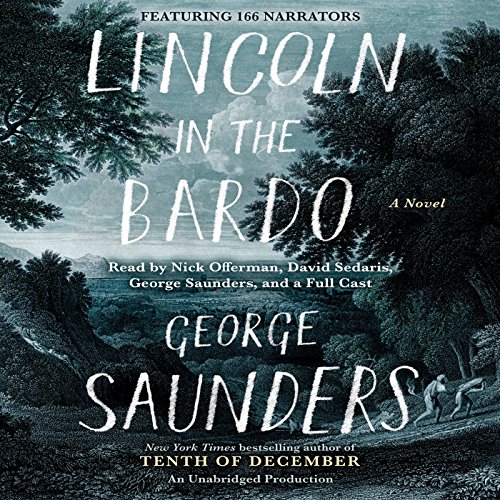
The long-awaited first novel from the author of Tenth of December: a moving and original father-son story featuring none other than Abraham Lincoln, as well as an unforgettable cast of supporting characters, living and dead, historical and invented.
February 1862. The Civil War is less than one year old. The fighting has begun in earnest, and the nation has begun to realize it is in for a long, bloody struggle. Meanwhile, President Lincoln’s beloved eleven-year-old son, Willie, lies upstairs in the White House, gravely ill. In a matter of days, despite predictions of a recovery, Willie dies and is laid to rest in a Georgetown cemetery. “My poor boy, he was too good for this earth,” the president says at the time. “God has called him home.” Newspapers report that a grief-stricken Lincoln returns, alone, to the crypt several times to hold his boy’s body.
From that seed of historical truth, George Saunders spins an unforgettable story of familial love and loss that breaks free of its realistic, historical framework into a supernatural realm both hilarious and terrifying. Willie Lincoln finds himself in a strange purgatory where ghosts mingle, gripe, commiserate, quarrel, and enact bizarre acts of penance. Within this transitional state-called, in the Tibetan tradition, the bardo-a monumental struggle erupts over young Willie’s soul.
Lincoln in the Bardo is an astonishing feat of imagination and a bold step forward from one of the most important and influential writers of his generation. Formally daring, generous in spirit, deeply concerned with matters of the heart, it is a testament to fiction’s ability to speak honestly and powerfully to the things that really matter to us. Saunders has invented a thrilling new form that deploys a kaleidoscopic, theatrical panorama of voices to ask a timeless, profound question: How do we live and love when we know that everything we love must end?
The 166-person full cast features award-winning actors and musicians, as well as a number of Saunders’ family, friends, and members of his publishing team, including, in order of their appearance:
Nick Offerman as HANS VOLLMAN
David Sedaris as ROGER BEVINS III
Carrie Brownstein as ISABELLE PERKINS
George Saunders as THE REVEREND EVERLY THOMAS
Miranda July as MRS. ELIZABETH CRAWFORD
Lena Dunham as ELISE TRAYNOR
Ben Stiller as JACK MANDERS vJulianne Moore as JANE ELLIS
Susan Sarandon as MRS. ABIGAIL BLASS
Bradley Whitford as LT. CECIL STONE
Bill Hader as EDDIE BARON
Megan Mullally as BETSY BARON
Rainn Wilson as PERCIVAL “DASH” COLLIER
Jeff Tweedy as CAPTAIN WILLIAM PRINCE
Kat Dennings as MISS TAMARA DOOLITTLE
Jeffrey Tambor as PROFESSOR EDMUND BLOOMER
Mike O’Brien as LAWRENCE T. DECROIX
Keegan-Michael Key as ELSON FARWELL
Don Cheadle as THOMAS HAVENS
and Patrick Wilson as STANLEY “PERFESSER” LIPPERT
with Kirby Heyborne as WILLIE LINCOLN,
Mary Karr as MRS. ROSE MILLAND,
and Cassandra Campbell as Your Narrator

Disorienting, challenging and really brilliant This is not an easy book but I do think it’s a great one. It’s something you’ve never read before. Imagine those people in the last century who read Mrs. Dalloway or Ulysses for the first time. How strange it must have seemed to have life, experience and art compressed into a day, a party, a walk through Dublin. So it is with Lincoln in the Bardo it’s both challenging AND disorienting but extremely rewarding if you can push through your own discomfort and confusion and stay with a novel that…
Lincoln in the Bardo George Saunders’ first novel lives up to his reputation for eccentric melding of genres and forms. Lincoln may be in the title (which Lincoln is meant is another matter), but the book is as much about its other, fictional narrators as it is about historical figures. What other narrators? Well. Abraham Lincoln’s third son died of typhoid fever in early 1862, and for a time the president’s concentration was broken while the Civil War raged. Newspapers reported that he returned to the crypt by…
Move Over Dante! Before you crack open George Saunders’ new (first) novel, “Lincoln in the Bardo”, you must empty your mind of what you expect an historical novel to be. Both the structure and the narrative are incredibly non-traditional, somewhat experimental, often disorienting, but ultimately fulfilling. Let me assure you that if you open your mind, you’ll not only get used to it, you will enjoy it thoroughly.